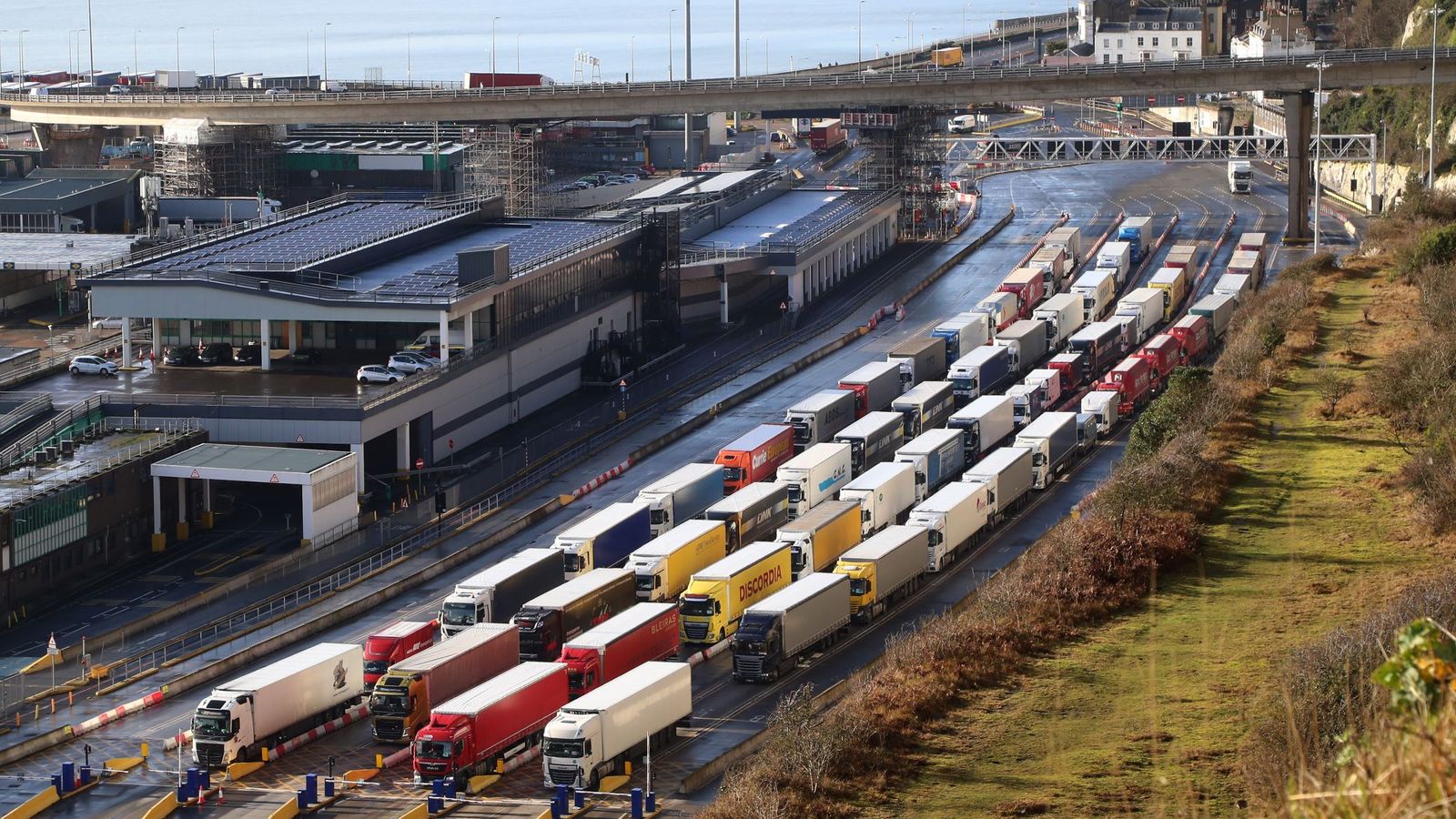Border disruption with the EU, caused in part by Brexit, is expected to cause an economic hit in the first three months of this year, according to Whitehall’s fiscal watchdog.
In its latest economic forecast, the Office for Budget Responsibility said it expected “near-term disruption” to trade in goods with the EU to reduce gross domestic product (GDP), a measure of the size of the economy, by 0.5% in the first quarter of 2021.
The OBR said its previous forecasts had “assumed a smooth transition” to the new trading relationship with the EU, with it expected traders would be given “time to adjust”.
A special edition of the Sky News Daily podcast will be available from 7pm.
But it noted that, while the UK had “delayed or reduced” the application of new border checks until later this year, the bloc had “applied full customs requirements due on exports from Great Britain to the EU” since the end of the Brexit transition period on 1 January.
COVID travel restrictions imposed on the UK by the EU following the discovery of the Kent variant of the virus in Britain, as well as Brexit stockpiling prior to the end of the transition period, had “clouded” the picture of post-Brexit trade, the OBR said.
But the watchdog added: “Taking all these factors into account, we now expect the temporary near-term disruption to EU-UK goods trade to reduce GDP by 0.5% in the first quarter of this year.
“This reflects both that exports appear to have been hit harder than imports and that the trade disruption will affect UK supply chains.
“As firms on both sides of the Channel grow accustomed to new trading arrangements, this disruption dissipates, though further disruption is possible when the UK enforces the agreement in full on its side of the border later in the year.”
Please use Chrome browser for a more accessible video player
Overall, the OBR noted how the agreement of a post-Brexit trade deal between the UK and EU had “partially resolved four-and-a-half years of uncertainty concerning our future trading relationship with our single largest trading partner”.
They judged the terms of Prime Minister Boris Johnson’s deal to be “broadly in line with the typical free trade agreement assumed in our previous forecasts”, which they estimated would lead to “a long-run loss of productivity of around 4% compared with remaining in the EU”.
The OBR’s latest economic forecast accompanied Chancellor Rishi Sunak’s budget on Wednesday, in which he hailed how the UK could now establish freeports – zones with different rules, including on tax, to make it easier and cheaper to do business – now it is outside of EU rules.
Mr Sunak announced the location of eight freeports in England at East Midlands Airport, Felixstowe and Harwich, Humber, Liverpool City Region, Plymouth, Solent, Thames and Teesside.
The budget also saw the chancellor use the UK’s ability to act outside of Brussels regulations to increase the limit on single contactless payments from £45 to £100.
But Labour leader Sir Keir Starmer advised Mr Sunak to instead concentrate on supporting businesses through the implementation of the Brexit trade deal.
The government has previously acknowledged the move to new trading arrangements with the EU has caused “teething problems” for firms, including those involved in trade between Great Britain and Northern Ireland and for seafood exporters.
“Instead of putting blind faith in freeports, the chancellor would be better served making sure the government’s Brexit deal actually works for Britain’s manufacturers, who now face more red-tape when they were promised less,” Sir Keir said.
“For our financial services – still waiting for the chancellor to make good on his promises.
“For the small businesses and fishing communities whose goods and produce are now left unsold in warehouses.
“And for our artists and performers who just want to be able to tour.”






















